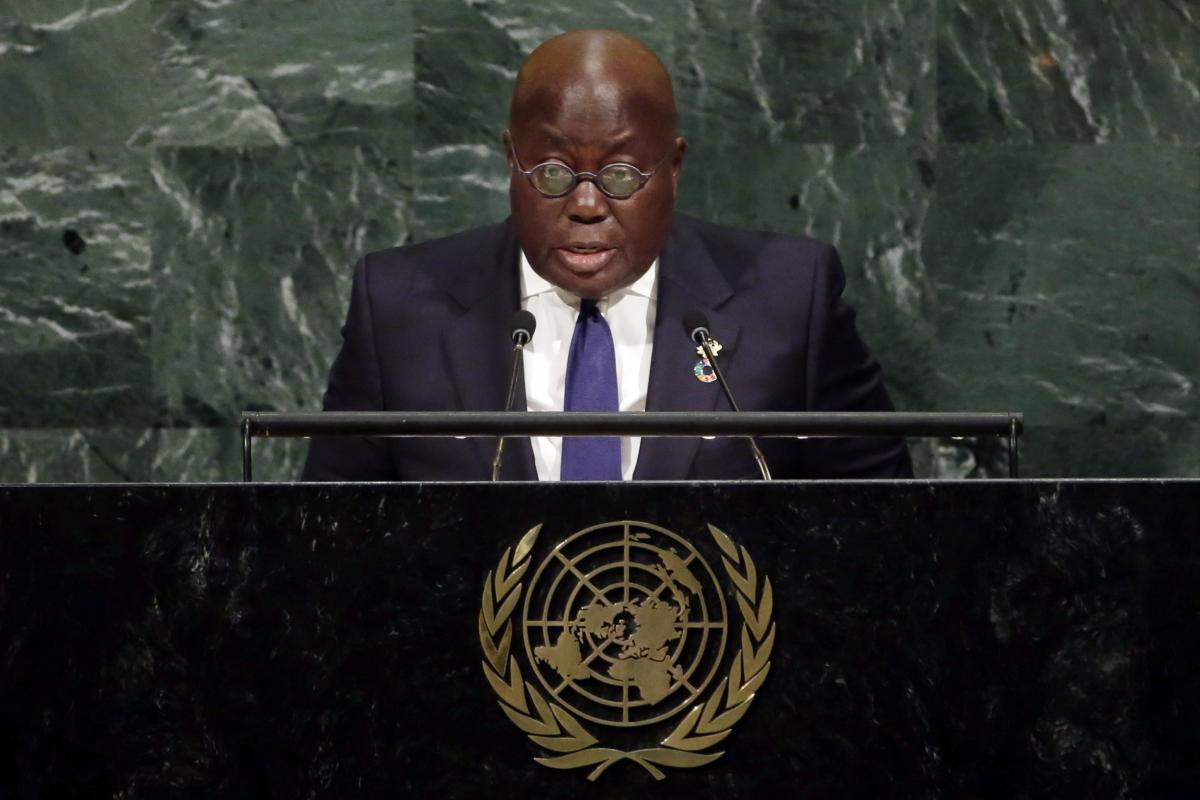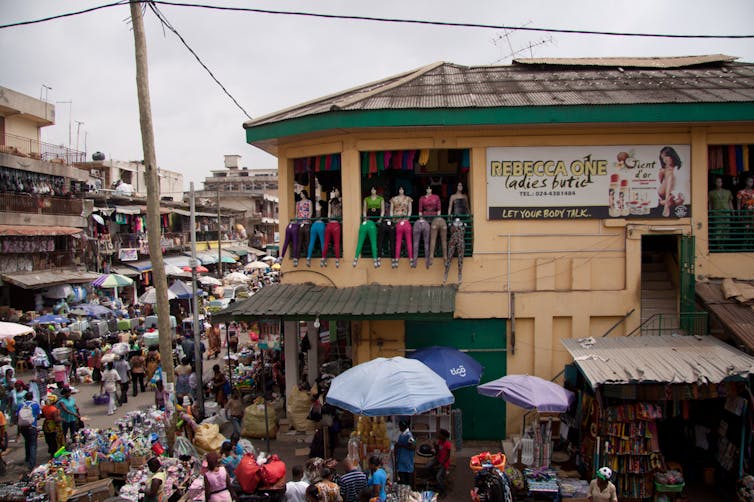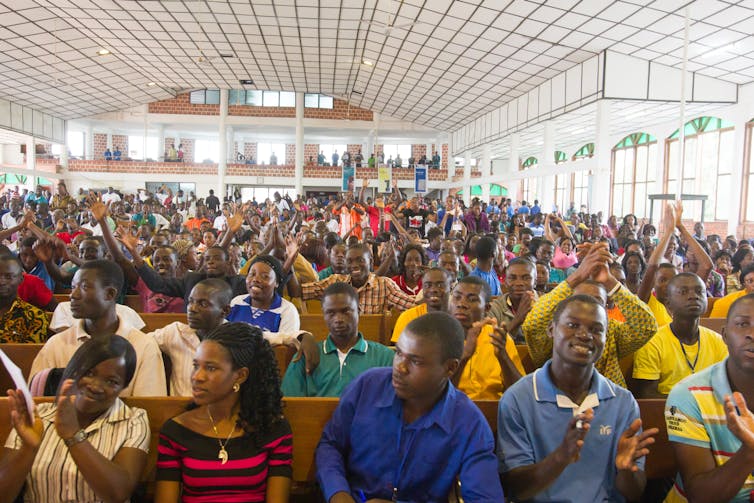In his first address on the state of Ghana in February 2017, President Nana Akufo-Addo declared a new vision: “A Ghana beyond aid.”

President Nana Akufo-Addo of Ghana addresses the United Nations General Assembly, at U.N. headquarters in September 2017. (AP Photo/Richard Drew)
This vision seeks to ensure that Ghana becomes self-sufficient by “mobilizing domestic resources” rather than depending on foreign aid for development. The president extended his vision to other African countries during an event hosted by the Royal African Society in London a few months later. While speaking on the theme Africa Beyond Aid, he declared:
“It is time to build our economies that are not dependent on charity and handouts … we are not disclaiming aid, but we do want to discard a mindset of dependency… it is unhealthy for both the giver and the receiver.”
While the proposed renaissance primarily focuses on “mobilizing domestic resources,” no attention has been paid to the religious resources available.
What are religious resources?
The Dutch scholar of religion and development, Gerrie ter Haar, categorizes religious resources into religious ideas (what people actually believe), religious practices (rituals), religious organizations (how religious communities function) and religious experiences (such as the subjective experience of inner transformation).
The potential role of these dimensions of religion in regard to development in Africa has been discussed extensively by many scholars and by international development institutions — notably the World Bank and the International Monetary Fund. Scholars have even postulated that “Africa’s development in the 21st century will be shaped largely by religion.”
Ghana’s government envisions a strong bureaucratic system for taxation by implementing tax identification numbers for all citizens. Ghana has a tax population of about six million, but only 1.5 million Ghanaians are formally registered with the Ghana Revenue Authority (GRA).
The GRA faces organizational and structural inefficiencies amid the apparent hostility of citizens towards paying taxes. Tax evasion in Ghana is also high among urban dwellers because of the prominence of the underground economy and the high population density in cities.

The Makola Market in Accra, Ghana. Many city dwellers in Ghana do not pay taxes. Ariel Manka/Flickr
Interestingly, the challenges faced by the Ghanaian government in raising revenue from its own population through taxes stands in sharp contrast to the tenacity of religious organizations to “tithe” their own members for projects.
Many urban religious organizations, often Pentecostal-Charismatic, survive largely from the payment of tithes, offerings and donations. A tithe is one-tenth of a church-goer’s monthly income given to the church. An offering includes voluntary monies given by congregants at worship services. Regular offerings may sometimes be followed by special offerings designated for specific purposes that go beyond the frequent church expenditure.
Donations, in cash or material gifts, are sometimes called seed-sowing, and are also given to religious leaders — men or women of God who mediate the religious experience of believers.
Ghanaians more receptive to giving to churches
It’s evident many Ghanaians respond positively to financial appeals from churches compared to how they respond to government taxation measures.
For example, in July 2017, at a Pentecostal-Charismatic event in Accra with a crowd of about 50,000 people, screen shots of “special offerings” went viral on social media, causing a huge public stir. The screen shots featured many types of offerings, namely, “millionaire status offering” ($5,000), the “seed of 1,000 times more” offering ($1,000), and the “24-hour miracle” offering ($240).
While event organizers did not reveal the amount of money generated, an estimated 2.25 million Cedis (US$505,000) was reportedly raised.

Many Ghanaians respond positively to financial appeals in churches. Ock So Park/Flickr
Why are government agencies in Ghana unable to efficiently generate taxes in areas where religious organizations seemingly flourish via tithing?
Are religious organizations in Ghana better at mobilizing financial resources than government agencies? Many answers can be provided, but I suggest three.
Rewarded for giving?
First, the act of giving in African Pentecostalism is rationalized with religious/theological foundations so that tithing is understood as transactional or reciprocal. When seeds of money and gifts are sown, the faithful are taught to expect different forms of divine harvest such as money, employment, good health and good fortune in life.
Second, tithing assumes a sociological implication by which adherents identify themselves as belonging to religious communities, not just believing.
Third, the failure of government to deliver on its promises of development compels many people to turn to religious organizations that “claim to possess answers to Ghanaians’ most pressing need – socio-economic transformation.”
Perhaps moving Ghana beyond aid might not be so much about developing new policy instruments, but rather identifying a new strategy to implement those policies. Considering the inefficiencies with taxation, there is certainly the need to bring all potential stakeholders on board — chiefly, religious organizations.
This is not to say that conforming to religious ideas and the operations of religious organizations will lead to better development outcomes. Neither am I arguing for a greater or lesser role of religion as Ghana moves beyond aid. It is also not a recommendation for government to renounce the apparent separation of church and state.
The point here is to acknowledge that religion conspicuously appeals to many people in Ghana in ways that governments do not, and to encourage dialogue between development partners, religious organizations and government — for the good of all Ghanaians.
James Kwateng-Yeboah, Ph.D Candidate in Cultural Studies, Queen’s University, Ontario
This article was originally published on The Conversation. Read the original article.